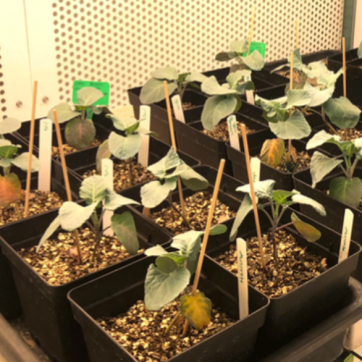Fertile ground for growth

Bio-F Solutions develops sustainable bio-fertilisers using microorganisms to capture essential nutrients from water and air and deliver them back into the soil to promote healthy crop growth. The company aims to make sustainable fertilisers a reality as the current production, via the Haber-Bosch process, consumes up to two per cent of fossil fuels for its production and is estimated to generate 1.6 per cent of greenhouse gas emissions globally.
Problem
Bio-F targets the two main nutrients in fertiliser: nitrogen and phosphorus. Plants need large amounts of them to grow, so they’re usually the first thing lacking from the soil. Although di-nitrogen (N2) is abundant in the air (78% v/v), it can’t be used by plants in its molecular form.
The Haber-Bosch process, invented a century ago, allows N2 to be converted into a bioavailable form of N (NH3). In the long term, the current production of nitrogen fertilisers through the Haber-Bosch process is unsustainable. It consumes one to two per cent of fossil fuels and generates 1.6 per cent of greenhouse gas emissions globally, substantially contributing to climate change.
And when those fertilisers are used, they’re not benign. Up to 60 per cent of applied fertilisers are lost to the environment, either naturally converted into N2O (a greenhouse gas with more than 300 times the warming potential of CO2) or causing direct environmental damage like eutrophication, which is estimated to cost up to £160 million per year in damages in the UK alone.
In addition, phosphorus is a natural resource that needs to be mined, with finite reserves. It’s expected to run out within 50 to 100 years.
Solution
Bio-F has developed a biofertiliser that harnesses the power of microorganisms to produce high-quality nutrients for agriculture. It’s suitable for organic soils, hydroponic systems and conventional farming. In addition to being ecological, Bio-F says its fertiliser has the potential to dramatically increase soil productivity, reduce farming net costs and minimize nitrogen run-off.
Impact
Bio-F anticipates that its fertiliser will substantially reduce the release of GHGs, which are generated during both production and use of inorganic fertilisers.
What did EIT Climate-KIC do?
Bio-F is a graduate of the 2018 Greenhouse Programme. During their six months with EIT Climate-KIC they won prizes and recognition including:
- EIT Food Entrepreneurship Prize, one of three finalists, winning 10,000 euros. At the end of the awards ceremony they also won the People’s Choice Award
- EIT Global Food Venture Programme, first prize 25,000 euros
- Pitch competition at the S2S Entrepreneurship workshop series, 300 GBP
- One of the top six start-ups at the CleanTech Challenge.
Marine Valton, co-founder and Bio-F lead says: “We learnt lots of skills on the Greenhouse programme including business creation, team building, management, negotiation and pitching. We did a lot of that last year and applied our learnings in many competitions. Coaching from the Greenhouse programme was essential for us to win prizes. You have to learn how to pitch succinctly as you rarely get more than two to five minutes to make your point.”
“The network we built with other participants was fantastic, a great opportunity to learn. The programme was very practical and felt customised to our business. When we wondered where we sat in relations to intellectual property (IP) our mentor put us directly in touch with a patent attorney, who helped us. Regular meetings with our mentor helped us to set Bio-F for the future.”

